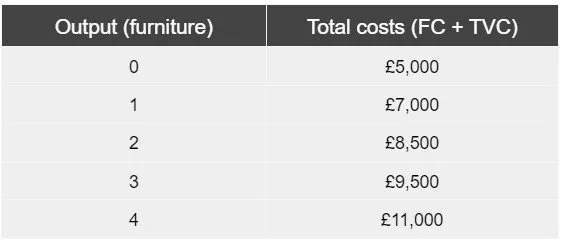A1 Marginal Costing
Marginal costing is calculating the change in total cost when an additional unit of output is produced. As fixed costs have already been accounted for, this method allocates variable costs (direct costs). Variable costs per unit may change due to economies of scale as output increases.
Marginal Cost (MC) = Change in Total Cost (TC) ÷ Change in Quantity (Q)
Marginal Costing Example
Chester Drawers is a carpentry workshop in North Wales. They specialise in hand carving and upholstery. Their monthly fixed costs are £5,000. The total costs at different levels of output are illustrated in the table below.
Note: variable cost per unit may change as a result of economies of scale.
Output (furniture)
0
1
2
3
4
Total Cost (TC)
£5,000
£7,000
£8,500
£9,500
£11,000
Marginal Cost (MC)
-
(£7,000 - £5,000) ÷ 1 = £2,000
(£8,500 - £7,000) ÷ 1 = £1,500
(£9,500 - £8,500) ÷ 1 = £1,000
(£11,000 - £9,500) ÷ 1 = £1,500
Note: the change in output will not necessarily be 1. Ensure you divide the change in TC by the change in output.


